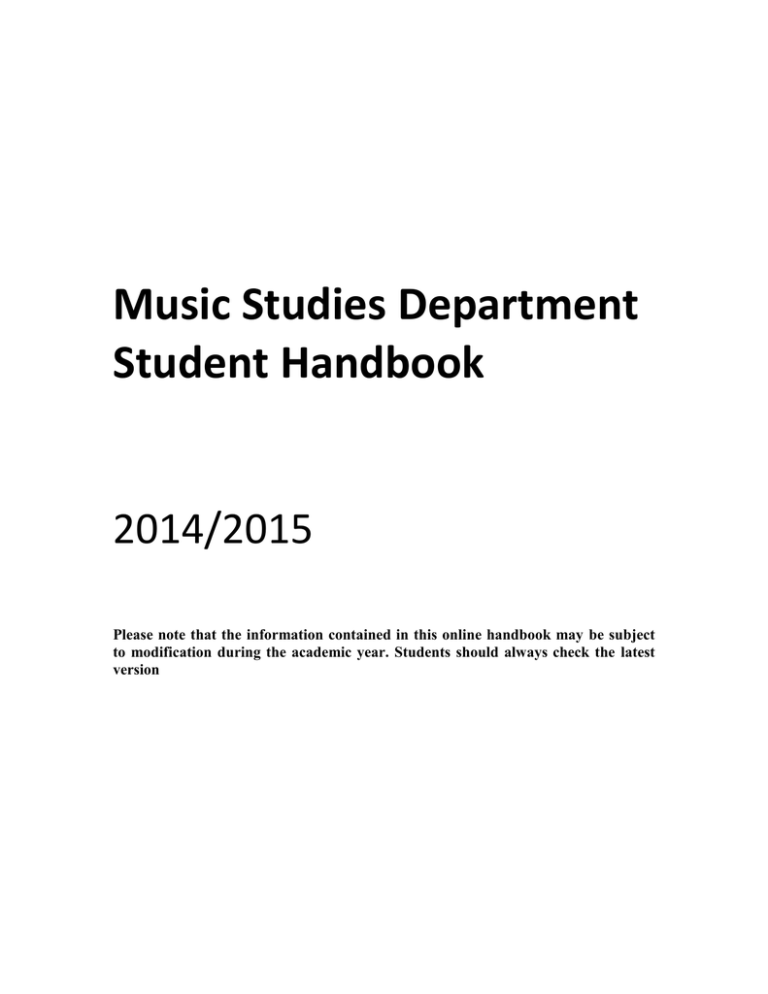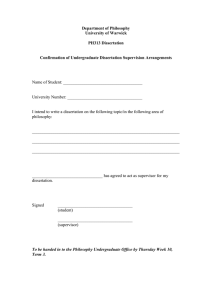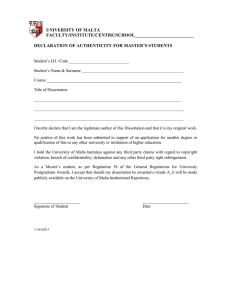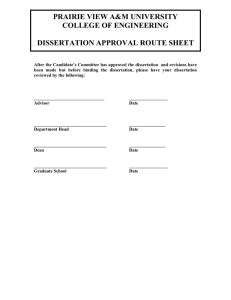Music Studies Department Student Handbook 2014/2015
advertisement

Music Studies Department Student Handbook 2014/2015 Please note that the information contained in this online handbook may be subject to modification during the academic year. Students should always check the latest version CONTENTS SECTION A: GENERAL INFORMATION Page Introduction Academic Staff Administrative Staff The Board of Studies in Music Whom to See in the Departmental Staff IT Facilities and Assistance Communication 1 1 2 2 2 3 3 SECTION B: USE OF DEPARTMENTAL FACILITIES Page The Use of the Music Room Use and booking of the School of Performing Arts Spaces SECTION C: LEARNING AND TEACHING Programme of Studies General Regulations, Bye-Laws and Procedures Academic Progress and Opportunities SECTION D: SUBMISSION OF WORK Dissertation Word Counts and Portfolios Submission of Work Student Conduct: Regulations and Procedures 3 4 Page 4 5 5 Page 6 7 7 SECTION A: GENERAL INFORMATION Introduction The Music Studies Department within the School of Performing Arts offers a range of undergraduate courses, as well as postgraduate studies in musicology and ethnomusicology, composition, and performance. As an undergraduate or graduate student you can study composition, performance, historical musicology and ethnomusicology with a team of specialists in their respective fields. All this is delivered in a dynamic environment that encourages musical creativity and practice whilst, at the same time, providing ample opportunities for the combination of these with an array of scholarly interests. Apart from that, the Department supports ensembles open to students coming from other Faculties and Departments. These include the University Vocal Ensemble, the University String Ensemble and the University Wind Ensemble. Our students are also encouraged to benefit from courses offered by the other Departments within the School. This helps students adopt an interdisciplinary approach to the study of music which in itself opens up more opportunities in terms of career. A degree in music is the key to several job opportunities. These include jobs in teaching, the recording industry, professional orchestral playing, a freelance life as a professional composer or performer, cultural management and administration, and job opportunities in the entertainment sector and the media just to mention a few. In addition, a degree in music is sometimes considered as an asset by employers seeking formal evidence of professional training in creativity from prospective employees. Academic Staff Dr John Galea (Head of Department) Dr Philip Ciantar Dr Frederick Aquilina Prof. Michael Laus Dr Albert Pace Dr Gordon Zammit Dr Hans-Jürgen Nagel Dr Rebecca Hall Dr Reuben Pace Ms Claire Massa Ms Mariella Cassar Ms Natalia Filipenko Mr Ruben Zahra Mr Godfrey Mifsud Mr Yaroslav Miklukuo Mr Dominic Galea Ms Veronique Vella Mr Daniel Cauchi Mr Mark Gauci 1 Administrative Staff Mr Stefan Sacco School of Performing Arts, Administrative Officer. Email: Stefan.sacco@um.edu.mt Music Studies Secretary: 2340 2048 The Board of Studies in Music Dr John Galea (Chairperson) Prof. Michael Laus Dr Frederick Aquilina Dr Philip Ciantar Whom to See in the Departmental Staff Administrative Roles Head of Department: Dr John Galea Research Coordinator: Dr Philip Ciantar Undergraduate Coordinator: Dr John Galea Postgraduate Coordinator: Dr Frederick Aquilina Student Experience Coordinator: Dr Frederick Aquilina Outreach and Cultural Engagement Coordinator: Dr John Galea, Dr Philip Ciantar Public Profile and Publicity: Dr John Galea, Dr Philip Ciantar, Ms. Michela Casha Department Handbook: Dr Philip Ciantar ERASMUS Coordinator: Dr John Galea Ethics Representative: Dr Gordon Zammit MATSEC Coordinator: Dr John Galea 2 IT Facilities and Assistance Students are expected to become familiar and use effectively IT facilities, such as the VLE and eSims. For more information on the use and applicability of these please read carefully material provided at http://www.um.edu.mt/itservices/students Communication Emails Please make sure to check regularly your University of Malta emails at your personal UoM mailbox as all emails and updates will be sent to this address. You may find lecturers’ contact details by using the following engine search http://www.um.edu.mt/search Notice Boards Kindly check regularly any notices placed on the Departmental notice boards situated next to Music Room (MDT 124). School of Performing Arts Website The School of Performing Arts website (at http://www.um.edu.mt/performingarts) contains important information regarding ongoing activities of the School, as well as useful material such as timetables, list of optional study units, and registration forms. Students are expected to visit this website on regular basis in order to keep themselves updated with any changes and announcements. From this website students may also access the Music Studies page at http://www.um.edu.mt/performingarts/music. Students are also encouraged to visit the Music Studies Department Facebook page at https://www.facebook.com/uom.musicstudies. SECTION B: USE OF DEPARTMENTAL FACILITES The Use of the Music Room (MDT 124) Kindly note that all bookings for Room MDT124 should be submitted to the Departmental Secretary at least 1 week in advance. One-Off-Booking forms for Students and Staff may be accessed through the following link: https://www.um.edu.mt/performingarts/musicbookingstaffstud (Please note that no bookings are available after 6.00pm) The booking form for Visiting Clients and School Events may be accessed through the following link: https://www.um.edu.mt/performingarts/musicbookingvisiting 3 Persons wishing to make use of the Music Room must estimate well the number of hours needed, as they will not be allowed to use the room beyond the time specified in their booking form. List of Instruments and Equipment available in room MDT124: Upright Piano Grand Piano Harpsichord Two Monitors DVD Player Video Player The school retains the right to refuse or cancel any booking for the aforementioned room. Use and Booking of the School of Performing Arts Spaces MITP Valletta The booking form for Students and School of Performing Arts staff may be accessed by following the link below: https://www.um.edu.mt/performingarts/mitpbookingstaffstud The booking form for Visiting Clients and School Events may be accessed by following this link: https://www.um.edu.mt/performingarts/mitpbookingvisitingevents Dance Studios (San Gwann) The Dance Studios may be booked by sending an email to Ms Priscilla Grima on priscilla.grima@um.edu.mt SECTION C: LEARNING AND TEACHING Programme of Studies Undergraduate B.A. Programmes All Undergraduate B.A. programmes in music are available at http://www.um.edu.mt/courses/list.php. Please make sure to follow the appropriate link/s applicable to your course. Postgraduate Studies At Postgraduate level, the Music Department offers both Masters and Doctorate degrees in musicology, ethnomusicology, composition and performance. These can be taken on both part-time and full-time basis. 4 Postgraduate M.Mus Programmes For details concerning the structure and content of the M.Mus programme of studies for musicology, ethnomusicology, composition and performance (both full-time and part-time) kindly see http://www.um.edu.mt/courses/list.php. General Regulations, Bye-Laws and Procedures For information and procedures regulating the award of an undergraduate degree see http://www.um.edu.mt/__data/assets/pdf_file/0005/47390/harmonisedregs-09.pdf.pdf For Faculty of Arts regulations and bye-laws for the Bachelor of Arts and Bachelor of Arts (Honours) courses commencing PRIOR to October 2010 see http://www.um.edu.mt/registrar/regulations/faculties/arts/ba-bah-bl2005-1 For Faculty of Arts regulations and bye-laws for the Bachelor of Arts and Bachelor of Arts (Honours) courses commencing in October 2010 or later see http://www.um.edu.mt/__data/assets/pdf_file/0013/103405/BABAH-BL-2005-2.pdf.pdf For information and procedures regulating the award of a postgraduate degree see http://www.um.edu.mt/__data/assets/pdf_file/0013/10831/Postgraduate_Harmonised_Regulations.pdf.pdf For School of Performing Arts regulations and Bye-Laws see http://www.um.edu.mt/registrar/regulations/faculties/performingarts Academic Progress and Opportunities Bachelor of Arts (Honours) in Music At the end of the first year, students who attain a 65% average (or above) may opt to follow the Honours degree in Music. These students will be required to choose one of the following majoring streams: musicology, performance or composition. Once the student has chosen one of the above majoring streams s/he will be automatically binding himself/herself to pursue studying that stream during the second and third year of the course. During the second and third years of the course a student must take all the compulsory study-units of his/her chosen majoring stream of study. In addition, these students are required to register for a number of elective study-units which may be taken from the elective units on offer and/or from the other two majoring areas as applicable and in consultation with the Head of Department. Master of Music (M.Mus) At the end of each year, postgraduate students and their supervisor must both fill in a Progress Report which will then be submitted to the Music Studies Secretary. 5 Assessment Feedback Sheets Following the assessment of study-units, both undergraduate and postgraduate students are given feedback sheets prepared by the respective study-unit tutor to help them improve their academic performance. Dissertation Supervision Reports Students following both undergraduate and postgraduate studies have to fill in a joint report with their supervisor following each supervision session. This report should be submitted by the student to the Music Studies Secretary after each supervision meeting. Erasmus Students are encouraged to go on Erasmus as this will help them attain a good experience abroad and establish professional networking. This should preferably take place in the second year of their studies. Research Seminars and Workshops All students are expected to attend for seminars and workshops organised by the School of Performing Arts. These should provide them with the opportunity to widen their academic preparation and learn how to work in an interdisciplinary context with other disciplines within the School. SECTION D: SUBMISSION OF WORK Dissertation Word Counts and Portfolios B.A. (Hons) Dissertation Students specialising in Composition: Portfolio and Dissertation (Minimum 8,000 Maximum 10,000) Students specialising in Performance Performance and Dissertation (Minimum 8,000 Maximum 10,000) Students specialising in Musicology Edition and Dissertation (Minimum 8,000 Maximum 12,000) Or Dissertation on a historical topic (Minimum 12,000 Maximum 15,000) 6 In the case of a dissertation in Ethnomusicology Transcriptions and Dissertation (Minimum 8,000 Maximum 12,000) Or Dissertation on an ethnomusicological topic (Minimum 12,000 Maximum 15,000) M.Mus, D.Mus and PhD Dissertations For dissertation word counts and portfolios see respective bye-laws at http://www.um.edu.mt/registrar/regulations/faculties/performingarts Submission of Work All assignments, portfolios and dissertations should be handed in to the Departmental Secretary before or on the agreed deadline date. Late submissions will be graded as either D (maximum grade) or F (minimum grade). Following the submission of dissertation and/or portfolio all students (undergraduate and postgraduate) will also have a viva-voce examination. Student Conduct: Regulations and Procedures For information regarding plagiarism, Turnitin and other useful University guidelines see http://www.um.edu.mt/registrar/student-conduct 7




